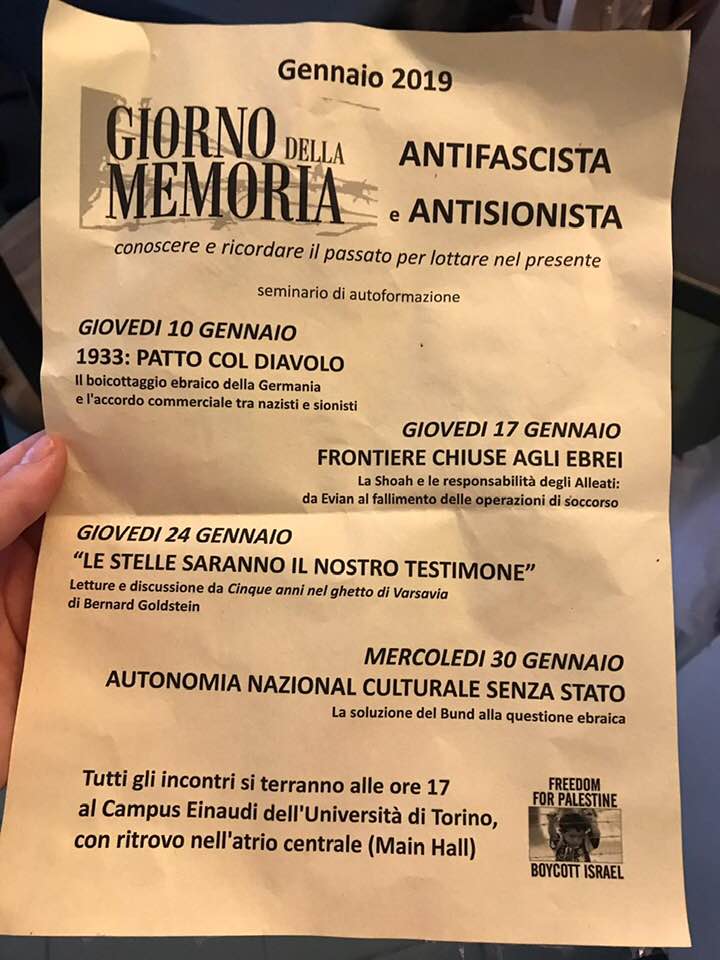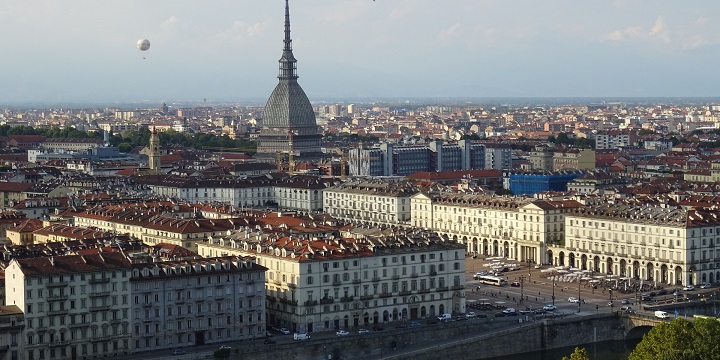As University of Turin Cancels Event Linking Zionists to Nazis, Some Jewish Advocates Hope for Positive Change
 by Shiri Moshe
by Shiri Moshe
A controversial seminar on Zionism and Nazism that was set to take place at the University of Turin in Italy on Thursday was cancelled amid public pressure — a move that may signal a change in approach by an institution that has been criticized for tolerating antisemitism in the guise of anti-Zionism.
The event — promoted in flyers with the logo, “Freedom for Palestine, Boycott Israel” — was one of four scheduled as part of an “Anti-Fascist and Anti-Zionist Memorial Day” program between January 10 and 30, as Italy commemorates International Holocaust Memorial Day on January 27.
Thursday’s gathering, titled, “1933: Pact with the devil,” specifically sought to explore “the Jewish boycott of Germany and the commercial agreement between Nazis and Zionists.” Other seminars would discuss the Jewish socialist Bundist movement, which historically rejected Zionism, and one of its main leaders in pre-war Poland, Warsaw Ghetto survivor Bernard Goldstein.

Flyers promoting “Anti-Fascist and Anti-Zionist Memorial Day” seminars at the University of Turin in Italy. Photo: Sardinian Holocaust Memorial Association.
News of the events — organized by activists affiliated with the Palestinian-led boycott, divestment, and sanctions (BDS) campaign — drew concern from some Italian Jewish groups, as well as letters of objection to university rector Gianmaria Ajani.
In his own note, Alessandro Matta, director and founder of the Sardinian Holocaust Memorial Association, called the first seminar “a perverse union between the worst Holocaust denialism and the worst antisemitic propaganda disguised as anti-Zionism.”
Matta told The Algemeiner that the school often served as a space where antisemitism was promoted under the banner of anti-Zionism, a concern shared by Emanuel Segre Amar, head of the Piedmontese Zionist Group, who cheered the event’s ultimate cancellation.
Segre Amar said administrators were waiting in the room where it was scheduled to take place, and told organizers that they could not convene on campus as they were not a recognized association — a long-standing policy that administrators also communicated to organizers on Wednesday, he added. The university had earlier confirmed that the event was not authorized by its staff, and pointed The Algemeiner to its statement when asked for comment.
The school is based in the northwestern Piedmont region, in a city with an aging Jewish population of less than 1,000, which is nonetheless estimated to be the fourth largest in Italy. The community — which Segre Amar helped lead as vice president for four years — “is culturally very active, but tends to be more attentive to what happened at the time of the Holocaust than to what is happening today,” he added.
In a bid to address this apparent gap, he decided to re-establish the Piedmontese Zionist Group, which was first founded under a different name by his grandmother in the 1920s. “We can not allow ourselves to be distracted by what is happening today in Israel, in the Middle East, in Italy and in Europe,” Segre Amar said. “We have to look in the face of those who declare, in our home and our language, that they want to fight and destroy us, even as Jews.”
He pointed to an anti-Zionist demonstration that took place in Milan in December 2017, where participants chanted in Arabic, “Khaybar, Khaybar, oh Jews, the army of Muhammad will return,” according to video footage published by Italian journalist Giulio Meotti. The slogan refers to a 7th century battle fought by the Islamic prophet Muhammad against Jewish tribes, and has been invoked by Islamist terrorist groups including Hamas and Hezbollah.
The Piedmontese Zionist Group, Segre Amar explained, is a small association with a few dozen members that seeks to counter such anti-Zionist ideology by organizing seminars and high-level conferences, as well as regular trips to Israel.
Perturbed by the many anti-Zionist seminars and lectures they saw hosted at the University of Turin, the group also turned its attention to the campus — an effort made by multiple Jewish community leaders in recent years.
Last January, for instance, the Union of Young Italian Jews (UGEI) and allied groups appealed to the university to cancel a talk on “Israel and the Exploitation of the Holocaust,” which was arranged by the same external BDS activists that later planned this year’s seminars. Yet the event went on as scheduled, despite a petition launched by the Sardinian Holocaust Memorial Association that attracted more than 3,600 signatures.
“The shameful accusations raised during the event muddy and invent and rewrite history,” UGEI wrote. “All this, we remember, took place in a university classroom. In what should be the sanctuary of knowledge.”
The group’s president later met with university rector Ajani in March, alongside the head of the Union of Italian Jewish Communities (UCEI) Noemi Di Segni and UCEI culture officer Prof. David Meghnagi of Roma Tre University — a conference that ultimately led to an agreement with the university to promote an educational program marking Israel’s 70th anniversary.
Yet in a June letter — sent as an event on “Italian Jews, Fascism and Zionism” was to be held on campus by the same unaffiliated BDS supporters — Di Segni noted “with immense regret” the university’s “worrying and increasing frequency to host meetings that have as their sole common denominator exploitation, hatred, denigration and distortion.”
“With your permissiveness towards some associations and even more with your deafening silence,” she continued, “you have allowed such an important and prestigious venue … to become a place impregnated with medieval obscurantism.”
While the university ultimately barred that event from taking place, it was only one of dozens of Israel-centric, hostile gatherings that took place on campus since 2015 — including a number held under the auspices of the Department of Culture, Politics, and Society, which offers students credits for some events, according to research by the Piedmontese Zionist Group and its partner, the Rome-based Solomon Observatory on Discrimination (SOD).
Others were coordinated by Progetto Palestina, a student group that distanced itself from this month’s seminars, but previously campaigned against the university’s cooperation agreement with Israel’s Technion, hosted multiple “Israel Apartheid Weeks,” and most recently led a disruptive walkout of a December panel discussion on Israeli history — the first event that was put together by the university, UCEI, and Roma Tre following the March meeting.
A subsequent meeting that took place last week with Ajani and Israeli Ambassador to Italy Ofer Sachs — part of an effort to strengthen Israeli cooperation with the university — did not appear to be interrupted.
Segre Amar said that while there were some Zionist professors on campus, “they are a minority” and did not have as much influence on students. “Furthermore, students who favor Israel’s positions rarely make their voices heard, and always without much notice,” he added.
Rather, he attributed the university’s apparent decision to more strictly enforce its policy against lending space to unsanctioned groups to the pressure it sustained, particularly from legal challenges brought forward by his group and the SOD.
“While it was virtually impossible, until now, to prevent disparaging ‘political’ events that attract hundreds of students” lured by the hope of gaining credits, he expressed hope that “thanks to ongoing legal action, something can change in the future.”
“The Piedmontese Zionist Group cannot organize anything directly on campus,” Segre Amar said. “[But] I still hope to be able to create significant educational opportunities for students in collaboration with the university.”
 Israeli Hostage Hersh Goldberg-Polin Seen Alive in a New Hamas Video
Israeli Hostage Hersh Goldberg-Polin Seen Alive in a New Hamas Video Palestinian Prime Minister Announces New Reform Package
Palestinian Prime Minister Announces New Reform Package France: Man Suspected of Abducting, Raping Jewish Woman ‘to Avenge Palestine’
France: Man Suspected of Abducting, Raping Jewish Woman ‘to Avenge Palestine’ Israel Intensifies Strikes Across Gaza, Orders New Evacuations in North
Israel Intensifies Strikes Across Gaza, Orders New Evacuations in North Iran Threatens to Annihilate Israel Should It Launch a Major Attack
Iran Threatens to Annihilate Israel Should It Launch a Major Attack ‘Completely Baseless’: Reports of Mass Graves at Gaza Hospitals are False, IDF Says
‘Completely Baseless’: Reports of Mass Graves at Gaza Hospitals are False, IDF Says Columbia University Shutters Campus as Jews Fear for Safety, Critics Call for President to Resign
Columbia University Shutters Campus as Jews Fear for Safety, Critics Call for President to Resign ‘Hamas, We Love You!’ A List of the Chants, Statements From Columbia University’s ‘Gaza Solidarity Encampment’
‘Hamas, We Love You!’ A List of the Chants, Statements From Columbia University’s ‘Gaza Solidarity Encampment’ ‘Useless Pigs’: Anti-Israel Demonstrations Rage at Yale University, Forcing Police Intervention
‘Useless Pigs’: Anti-Israel Demonstrations Rage at Yale University, Forcing Police Intervention Anti-Israel Protesters Interrupt Chelsea Handler Comedy Show Because of Her Support for Jewish State
Anti-Israel Protesters Interrupt Chelsea Handler Comedy Show Because of Her Support for Jewish State




 France: Man Suspected of Abducting, Raping Jewish Woman ‘to Avenge Palestine’
France: Man Suspected of Abducting, Raping Jewish Woman ‘to Avenge Palestine’ Palestinian Prime Minister Announces New Reform Package
Palestinian Prime Minister Announces New Reform Package Israeli Hostage Hersh Goldberg-Polin Seen Alive in a New Hamas Video
Israeli Hostage Hersh Goldberg-Polin Seen Alive in a New Hamas Video